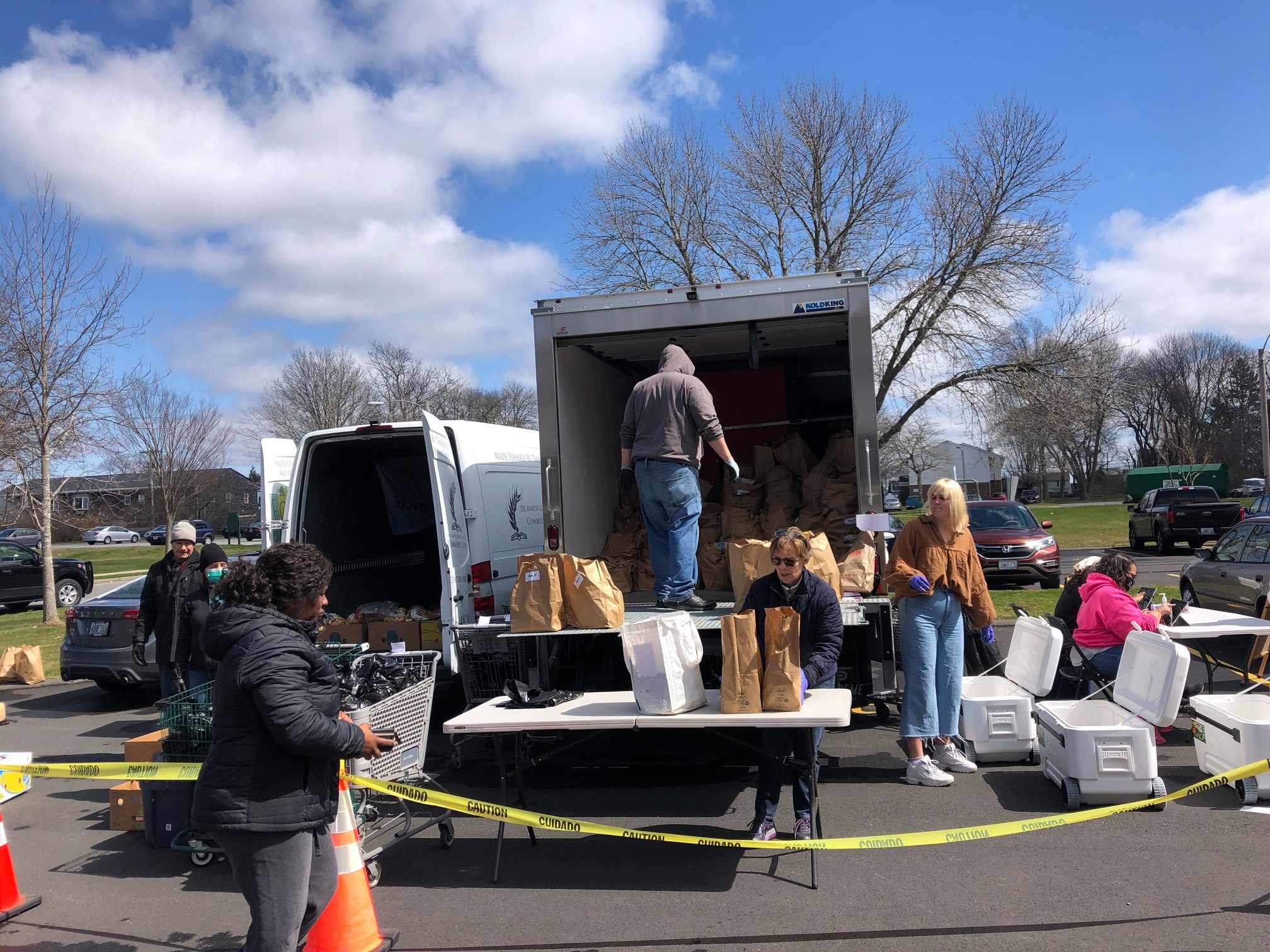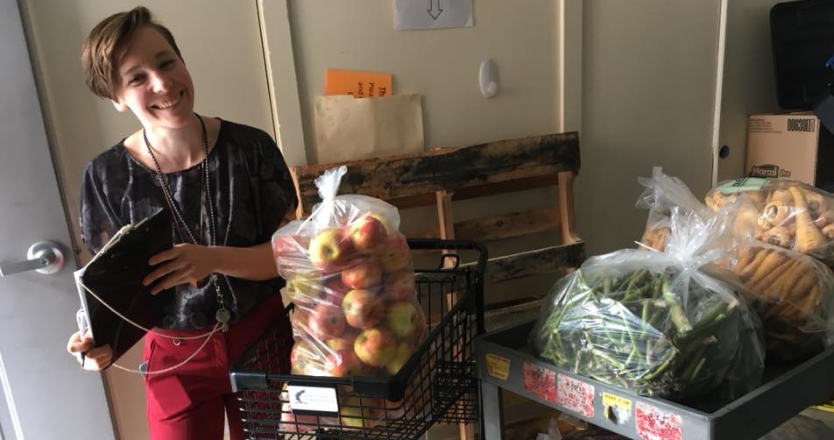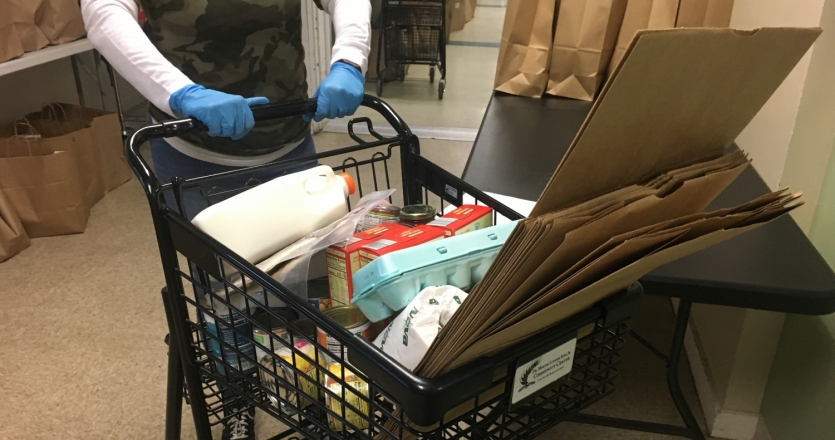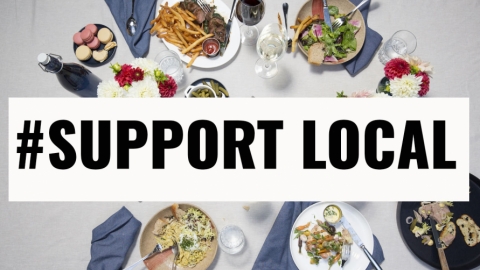A Food Pantry on Aquidneck Island Offers Hope Amid the Chaos
There were 25 people waiting in line at the Dr. Martin Luther King, Jr. Community Center Food Pantry (MLK) last Friday morning. Spaced six feet apart and wearing face masks, they were a somber crowd, anxious about their next meal.
This scene is familiar across the state and region, as food pantries have become popular places for all the wrong reasons. As more residents face unemployment and need help feeding their families due to forced business closures, pantries have seen a surge. Deep in hunger services, MLK has postponed other integral education and nutrition programs, and has been forced to eliminate crucial volunteer labor to lower Covid-19 exposure risk, while shifting existing staff to food services in order to escape its own layoffs. Meanwhile it is paying more for fresh food and is working with new local resources to provide produce and support to their own communities. This is another front line.
MLK’s Food Pantry in Newport is one of the state’s largest, feeding the city that claims Rhode Island’s fifth-highest rate of poverty. In the past month, however, its activity has skyrocketed, serving more than 1,900 people, including 380 first-time clients, not all of whom live beneath the poverty line. Its largest spike in recent years equates to nearly 50% of the individuals they fed in all of 2019, served in just four weeks.
“We have seen a huge increase in people who have never come to a pantry in their life and never imagined they would have to. Many are employees from restaurants and hotels who suddenly got laid off, and they’re trying to make ends meet,” says MLK’s Executive Director Heather Hole Strout. “We are seeing very grateful people. But they are scared, anxious—and the difference from when they walk in the door and walk out is stark.”
There is not typically a line to get in the door at MLK, Hole Strout explains, but then again, there is not typically a global pandemic either. So MLK is shifting its policies, procedures and expectations all around. It has enacted state and federal Department of Health and Centers for Disease Control standards to separate clients through social distancing measures. MLK limits access inside to one client at a time, and serves up to two weeks of pre-bagged groceries rather than allowing clients to shop for individual items. This means clients must wait outside, sometimes in inclement weather for up to 30 minutes. It’s not ideal, Hole Strout says, but they are striving to protect themselves as well as their clients amid unprecedented challenges and intensified demand.
“Our growth in 2019 was 16% over 2018. This year, our growth could be 30% if we continue, or more. It’s big,” Hole Strout says. “The biggest time we see new clients is at Thanksgiving and Christmas, so this growth is huge for this time of year. I have no idea where this will go. People who were already struggling will likely face an even harder time, and people who are newly struggling may need help for longer than they ever expected.”
Those struggles are being felt across the state and region, echoes Hugh Minor of RI Community Food Bank in Providence, which provides food to MLK every week. In just one week of March, it served 350,000 pounds of food, an increase of 100,000 pounds over the same week last year. For the month, it dispersed 39% more food than last March, and the trajectory continues to rise. In Massachusetts, the scene is parallel. The Greater Boston Food Bank has seen a 50% increase in demand, reports the Boston Globe, while March was its largest distribution month in 40 years, distributing eight million pounds of food, instead of five million, to its 600 partner agencies across the Commonwealth.
“Our focus is to keep the food system flowing. The challenge is to keep food coming in as fast as it’s going out, so we’re ordering far more food, but there are items that are not available to purchase, or the delivery time can be weeks,” Minor says. “Agencies are asking for more, too, so we’re adding bigger Saturday deliveries to make sure they don’t run out. Meanwhile, we are seeing less food donated by food stores, because people who can afford it are buying more at their local markets. That panic buying is impacting us, particularly at this level, so agencies have to rely on us even more to get food on their shelves.”
Despite the mountain of obstacles, these nonprofit agencies and food pantries are finding the silver lining. Since providing fresh produce is a hallmark of MLK’s hunger services work, it is continuing to make that a priority during this crisis. Last year, it purchased $150,000 worth of fresh fruits and veggies in addition to non-perishable items like spaghetti and tomato sauce, beans or peanut butter, for its indoor pantry, mobile food pantry and Food 2 Friends food delivery service to homebound seniors. That cost is slated to rise again in 2020, especially once MLK gets running normally and must do a big restock of essential items. How much, though, remains unclear, Hole Strout says.
Local Food to Pantry
Though the growing season is just getting underway now, and the harvest is yet to begin, there is plenty of local food to be found. MLK continues to work with local farms that are clearing out winter stocks and gleaning unused produce, including Jamestown Community Farm in Jamestown. MLK buys fresh milk from Arruda’s Dairy Farm in Tiverton, and works with organizations that rescue unused produce from farms, like Hope’s Harvest RI, which operates statewide.
Bob Sutton at Jamestown Community Farm has been donating food to MLK for almost the entirety of the farm’s 20 years, he says. He delivers as much as 20 to 30 dozen eggs each month, December through February, and when he offered a rare spring harvest of kale and collard greens this week, MLK gratefully accepted.
“We deliver 200 to 300 pounds of fresh produce each week to three agencies across the state, between 21,000 and 28,000 pounds, or 12 to 14 tons, each year,” he says. “Most of the food we deliver on Wednesdays to MLK and McAuley House in Providence. This is really a positive for local food production. We certainly believe the idea that fresh food shouldn’t be limited to people on the basis of money or access. So that’s our primary mission, and that goes on no matter what.”
Working directly with farms to harvest unused produce and divert it to pantries like MLK, Eva Agudelo of Hope’s Harvest RI is continuing the food conversation even further by reducing food waste in the system. If a farm has too many winter root crops in storage, for example, as Four Town Farm did last week, and it would be thrown away or turned under, Agudelo facilitates its convenient packaging and delivery to pantries that need it. As a result, Hope’s Harvest RI helped to distribute 4,740 pounds of gleaned produce in the past two weeks, including 800 pounds of lettuce from Gotham Greens, 1,500 pounds of frozen butternut squash and 2,700 pounds of root crops, to the RI Community Food Bank. Since 2018, it has recovered almost 115,000 pounds (57 tons) of fresh produce for local hunger relief agencies.
“We want to expand our ability to make sure farms have a market for their produce, and that market is where the need is. If people have lost their jobs and are visiting pantries in higher numbers than ever before, we need to fill the gap with local product,” Agudelo says. “We are very committed to farmers being successful and making a decent living. We want them to sell what they have. And we also want to make sure no one gets left behind. And that becomes a really important source of calories for our community because those who are visiting pantries need fresh nutritious food.”
The ability to move fresh food here is becoming more essential as producers consider the impact of their food on people staying well, she adds. Another consideration is the number of people who touch that food during its travels, how it is packaged and examined. Much fresh produce is packaged in large commercial service portions of 10 heads of lettuce or 15-pound bags of butternut squash, for example, which pantries must repackage for their individual clients or not accept at all if they lack refrigeration space. But reducing the number of hands on the food before it gets to the final client is what Agudelo is assessing, hoping to make it easier for pantries to accept more fresh food.
“We have to switch that thinking, and maybe bunch and pack the food in the field in a way that we didn’t used to do,” Agudelo says. “We also are rethinking our food safety plan, accounting for these new realities and making it easier for pantries moving forward. The goal is to repack [touch] the food as little as possible.”
Local Resilience
These day-by-day changes in processing and food movement are impacting the Ocean State’s infrastructure down to the last farmer and food pantry client. But many agree that in a global crisis like this, new opportunities for collaboration are popping up to instill lessons of hope amid the chaos.
“I am blown away by how resilient our emergency food system is and how everyone is stepping up to make sure everyone is fed. All the food pantries are having to pivot away from heavy reliance on volunteers, because they don’t want volunteers to be at risk,” Agudelo says. “Many pantries are run by senior citizens. They are passionate and do incredible work, but it’s not great that that’s how the system functions, because it’s not sustainable. There are no institutional assurances that those processes will continue to function. Pantries are filling such an essential need, but they don’t have nearly enough support to be feeding as many people as they are currently feeding.”
While MLK ceased food donations from the general public, financial contributions have increased alongside community awareness around food insecurity. At the beginning, Hole Strout and Minor say MLK and the RI Food Bank each received donations from restaurants that had to close abruptly and wanted to clear out perishable items. But now, they are not seeing those food donations because many food businesses are closed. “Even nationally it’s a struggle to get enough,” Minor says. “When there is a shortage, people start to panic: ‘We are getting supplies now, but in the long term, what will we run out of?’”
Hole Strout insists that MLK will not run out of anything, and she is working the front lines, as well as behind the scenes herself, to ensure MLK’s clients get what they need during this challenging time. Along with other pantries and meal sites statewide, Hole Strout also wants to guarantee that the long queues culminate in a meal for those who patiently wait.
“We’ve seen, as we have every time there is a crisis, people come together and want to help. We have seen incredible support from the community, including new donors who have never given, plus donations from far-away places. I am so grateful,” Hole Strout says. “We have received a couple donations from clients, which is really touching. It might be a small amount, but a $10 donation from someone who has nothing is like a million dollars to me.”
###
For more information, visit the Dr. Martin Luther King, Jr. Community Center, the RI Community Food Bank and Hope’s Harvest RI.
Photos courtesy of the Dr. Martin Luther King, Jr. Community Center.








